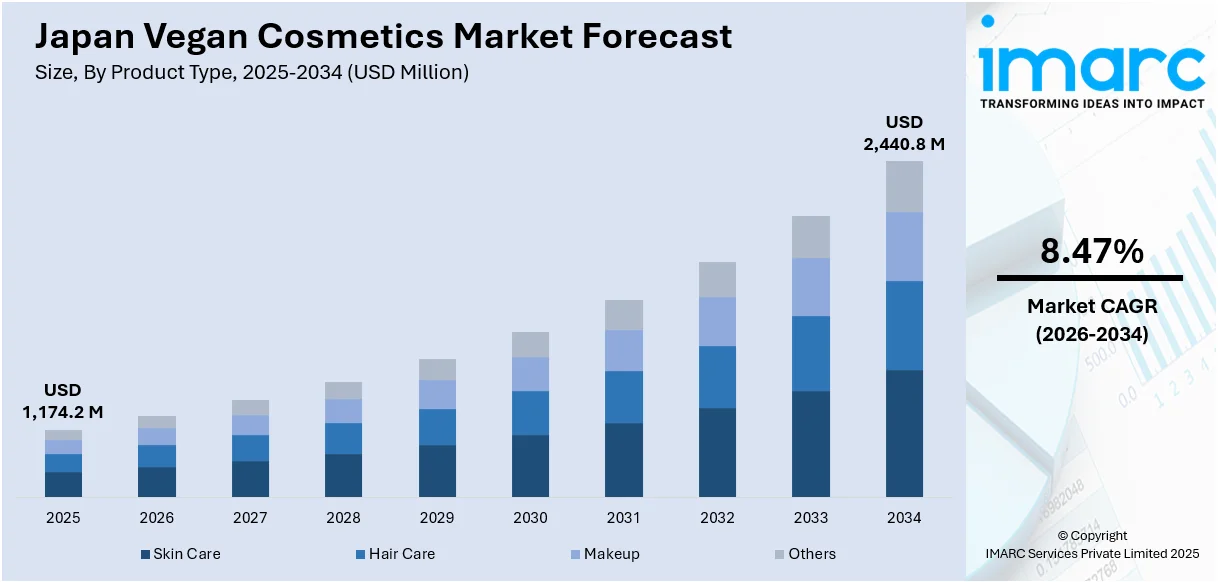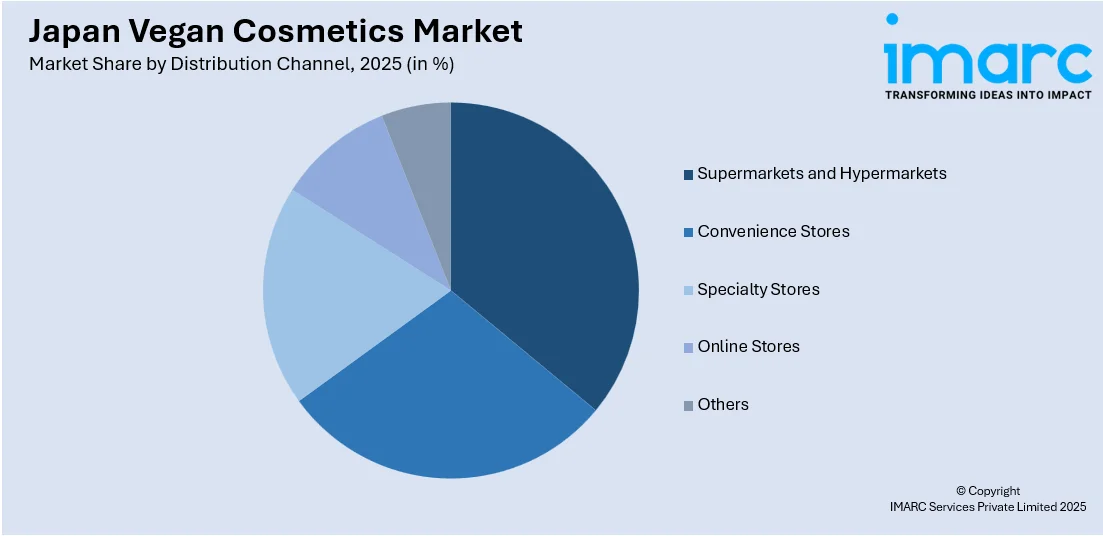
Japan Vegan Cosmetics Market Size, Share, Trends and Forecast by Product Type, Distribution Channel, and Region, 2026-2034
Japan Vegan Cosmetics Market Overview:
The Japan vegan cosmetics market size reached USD 1,174.2 Million in 2025. Looking forward, IMARC Group expects the market to reach USD 2,440.8 Million by 2034, exhibiting a growth rate (CAGR) of 8.47% during 2026-2034. In Japan, the growth of the vegan cosmetics market can be accredited to advanced plant-based formulation technologies, increasing adoption of international vegan certifications for trust and international competitiveness, and immersive retail strategies that educate and emotionally connect users through hands-on, story-driven brand experiences.
|
Report Attribute
|
Key Statistics
|
|---|---|
|
Base Year
|
2025 |
|
Forecast Years
|
2026-2034
|
|
Historical Years
|
2020-2025
|
| Market Size in 2025 | USD 1,174.2 Million |
| Market Forecast in 2034 | USD 2,440.8 Million |
| Market Growth Rate 2026-2034 | 8.47% |
Japan Vegan Cosmetics Market Trends:
Tech-Driven Product Innovation and Formulation
Japanese laboratories are investing in fermentation techniques, plant extraction processes, and sustainable chemistry to create effective vegan active ingredients. This advancement enables brands to provide efficient anti-aging, moisturizing, and sun-protection products without depending on animal-based ingredients. The technology-focused aspect of Japanese skincare establishes a high standard, and vegan offerings need to align with these criteria to succeed. With effectiveness and ethical sourcing increasingly harmonizing, individuals no longer have to sacrifice performance for values. Innovations in packaging are contributing as well, with refillable bottles and eco-friendly materials attracting environmentally aware consumers. The blend of science-driven effectiveness and transparent labeling is aiding vegan cosmetics to compete ethically and technically, establishing them as a viable option in Japan’s sophisticated beauty industry. In 2024, REI COSMETICS JAPAN (Rakuhuru Co., Ltd.) launched the 100% vegan cosmetic brand "Cocoon" from Vietnam in Japan. The brand combined innovation with local Vietnamese plant ingredients. Cocoon's products, such as skincare and haircare, were available on their official website.

To get more information on this market Request Sample
Changing Regulatory and Certification Landscape
Japan's cosmetics industry is slowly adjusting to worldwide regulatory movements that support clean, cruelty-free, and sustainable beauty items. The increasing user demand for certified products is motivating brands to pursue international vegan certifications. These certifications act as a sign of credibility and assist in exploring export possibilities in areas with clearer vegan guidelines. Japanese manufacturers seeking to remain competitive on a global scale are progressively investing in formulations that adhere to vegan standards. As a result, this regulatory synchronization is influencing local offerings, integrating more certified vegan products into the mainstream. As more people are becoming accustomed to international standards and seek product accountability, these certifications are emerging as an important indicator of trust. The move towards proactive compliance and certification is improving product quality while also broadening the market for ethically made, animal-free cosmetics in Japan’s changing beauty sector. In line with this trend, in 2024, KIWABI, a Japanese hair care brand, reformulated its grey hair-covering product for catering to vegan and Muslim users by obtaining vegan and halal certifications. The updated product included 29 plant extracts and natural oils, offering a gentle, mess-free application without damaging hair.
Experiential Marketing and Retail Storytelling
Pop-up events and tailored retail experiences are becoming important in the introduction and acceptance of vegan cosmetics in Japan. These formats enable brands to extend beyond shelf positioning, providing immersive settings where users can engage with products, learn about ingredient sources, and connect with brand principles. In upscale or trend-driven areas, such initiatives generate exclusivity and excitement, particularly when backed by refined design, ingredient clarity, and narrative themes. This approach is especially useful in informing individuals who might be unfamiliar with vegan cosmetics, clarifying plant-based compositions while fostering emotional connection. These experiences also create engagement on social media and media coverage, broadening their influence beyond the physical environment. With an increasing number of people looking for significant relationships with the products they utilize, experiential retail is emerging as a powerful factor in the rise of vegan beauty, particularly among shoppers who are mindful of trends and driven by ethical considerations. In 2024, AINOKI, a Japanese vegan cosmetics brand, hosted a pop-up event at the Beauty Apothecary on the B2F of Isetan Shinjuku to celebrate the launch of their new Moist Eye Balm. AINOKI's products focused on natural ingredients, aiming to deliver comfort and beauty from nature.
Japan Vegan Cosmetics Market Segmentation:
IMARC Group provides an analysis of the key trends in each segment of the market, along with forecasts at the regional level for 2026-2034. Our report has categorized the market based on product type, and distribution channel.
Product Type Insights:
- Skin Care
- Hair Care
- Makeup
- Others
The report has provided a detailed breakup and analysis of the market based on the product type. This includes skin care, hair care, makeup, and others.
Distribution Channel Insights:

Access the comprehensive market breakdown Request Sample
- Supermarkets and Hypermarkets
- Convenience Stores
- Specialty Stores
- Online Stores
- Others
A detailed breakup and analysis of the market based on the distribution channel have also been provided in the report. This includes supermarkets and hypermarkets, convenience stores, specialty stores, online stores, and others.
Regional Insights:
- Kanto Region
- Kansai/Kinki Region
- Central/ Chubu Region
- Kyushu-Okinawa Region
- Tohoku Region
- Chugoku Region
- Hokkaido Region
- Shikoku Region
The report has also provided a comprehensive analysis of all the major regional markets, which include Kanto Region, Kansai/Kinki Region, Central/ Chubu Region, Kyushu-Okinawa Region, Tohoku Region, Chugoku Region, Hokkaido Region, and Shikoku Region.
Competitive Landscape:
The market research report has also provided a comprehensive analysis of the competitive landscape. Competitive analysis such as market structure, key player positioning, top winning strategies, competitive dashboard, and company evaluation quadrant has been covered in the report. Also, detailed profiles of all major companies have been provided.
Japan Vegan Cosmetics Market News:
- In March 2025, LF Atte, a vegan beauty brand, entered Japan's leading variety shop, Loft, showcasing products at the "Loft Cosme Festival 2025 SS." The brand aims to expand its presence in Japan, including top cities like Shibuya and Osaka, through offline sales.
- In January 2024, vegan beauty brand Dinto opened its first overseas pop-up store in Tokyo, Japan, marking its expansion into the global market. The pop-up, held at Atocosme Tokyo, featured products like Blur Glow Lip and Blur Matte Cushion Foundation. Dinto aimed to strengthen brand awareness and expand into both online and offline channels in Japan, a key market for K-beauty.
Japan Vegan Cosmetics Market Report Coverage:
| Report Features | Details |
|---|---|
| Base Year of the Analysis | 2025 |
| Historical Period | 2020-2025 |
| Forecast Period | 2026-2034 |
| Units | Million USD |
| Scope of the Report |
Exploration of Historical Trends and Market Outlook, Industry Catalysts and Challenges, Segment-Wise Historical and Future Market Assessment:
|
| Product Types Covered | Skin Care, Hair Care, Makeup, Others |
| Distribution Channels Covered | Supermarkets and Hypermarkets, Convenience Stores, Specialty Stores, Online Stores, Others |
| Regions Covered | Kanto Region, Kansai/Kinki Region, Central/ Chubu Region, Kyushu-Okinawa Region, Tohoku Region, Chugoku Region, Hokkaido Region, Shikoku Region |
| Customization Scope | 10% Free Customization |
| Post-Sale Analyst Support | 10-12 Weeks |
| Delivery Format | PDF and Excel through Email (We can also provide the editable version of the report in PPT/Word format on special request) |
Key Questions Answered in This Report:
- How has the Japan vegan cosmetics market performed so far and how will it perform in the coming years?
- What is the breakup of the Japan vegan cosmetics market on the basis of product type?
- What is the breakup of the Japan vegan cosmetics market on the basis of distribution channel?
- What is the breakup of the Japan vegan cosmetics market on the basis of region?
- What are the various stages in the value chain of the Japan vegan cosmetics market?
- What are the key driving factors and challenges in the Japan vegan cosmetics market?
- What is the structure of the Japan vegan cosmetics market and who are the key players?
- What is the degree of competition in the Japan vegan cosmetics market?
Key Benefits for Stakeholders:
- IMARC’s industry report offers a comprehensive quantitative analysis of various market segments, historical and current market trends, market forecasts, and dynamics of the Japan vegan cosmetics market from 2020-2034.
- The research report provides the latest information on the market drivers, challenges, and opportunities in the Japan vegan cosmetics market.
- Porter's five forces analysis assist stakeholders in assessing the impact of new entrants, competitive rivalry, supplier power, buyer power, and the threat of substitution. It helps stakeholders to analyze the level of competition within the Japan vegan cosmetics industry and its attractiveness.
- Competitive landscape allows stakeholders to understand their competitive environment and provides an insight into the current positions of key players in the market.
Need more help?
- Speak to our experienced analysts for insights on the current market scenarios.
- Include additional segments and countries to customize the report as per your requirement.
- Gain an unparalleled competitive advantage in your domain by understanding how to utilize the report and positively impacting your operations and revenue.
- For further assistance, please connect with our analysts.
 Request Customization
Request Customization
 Speak to an Analyst
Speak to an Analyst
 Request Brochure
Request Brochure
 Inquire Before Buying
Inquire Before Buying




.webp)




.webp)












